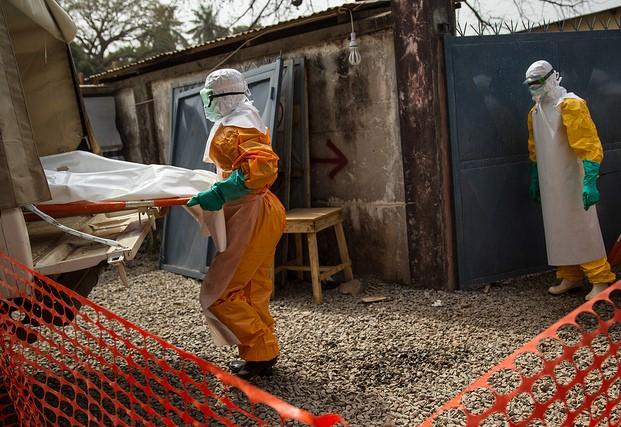With 11 new Ebola cases confirmed yesterday and today, the Democratic Republic of Congo's Ebola outbreak total climbed to 205 cases, amid new warning from the World Health Organization (WHO) that the security problems are getting worse and threaten to undermine the response, especially in Beni, the main hot spot.
As if to underscore the WHO's concerns, the DRC's health ministry yesterday described how community members stole the body of a woman who died at an Ebola treatment center as she was on her way to the cemetery to be buried, violently chasing off police before changing their mind and returning the body to the cemetery.
Then in its update today, the health ministry said an Ebola illness in someone working at response headquarters in Beni temporarily shuttered the office so that the location could be disinfected.
Cases top 200; latest surge mainly in Beni
Of the 11 new cases reported by the MOH, 6 were reported yesterday and 5 today. Eight are from Beni, plus one each from Masereka, Kalunguta, and Mabalako, raising the overall total to 205 cases, 170 of them confirmed and 35 classified as probable. The case-patient from Kalungata reflects a community death, and 7 other deaths were reported, all in Beni, raising the fatality count to 130.
Health officials are still investigating 32 suspected Ebola infections, which is up from 25 suspected cases 2 days ago.
In its update yesterday, the DRC said that, since early October, a significant rise in the number of new confirmed cases has come mainly from Beni. Of 39 new confirmed cases reported during the first 11 days of October, 32 (82%) were from the city, which has recently experienced conflict between rebel and armed groups, with resulting protests, and pockets of community resistance.
Regarding the cemetery incident, the health ministry said that the response team had made some concessions to the family, allowing a friend to drive the hearse and five family member to wear personal protective equipment (PPE) to carry the woman's casket. As part of the deal with the family, a police vehicle followed the procession to the cemetery.
However, the friend driving the hearse suddenly changed course to take the woman to a family plot in Beni's Butsili district, where young people from the neighborhood violently chased police and took the body. Then the group panicked and returned to the cemetery later in the day, where family members wearing PPE buried the body.
Yesterday several members of the family involved in the incident voluntarily went to Beni General Hospital for vaccination and said no one had manipulated the body between the Ebola treatment center and the cemetery. Officials said the neither the coffin nor the burial bag had been opened. And residents of the neighborhood where police were chased and the woman's body taken held a meeting and apologized to response teams, with the neighborhood's young people promising to not to let the situation happen again.
In today's update, the health ministry said one of the new cases involves a plumber from the United Nations Organization Stabilization Mission in the DRC (MONUSCO) who was working at the outbreak coordination headquarters in Beni. The plumber is hospitalized at an Ebola treatment center in the city.
Investigators found that the man had stayed at the center of a traditional healer where an earlier confirmed Ebola patient was seen before he or she was taken to an Ebola treatment center. Most of the response team at the MONUSCO office had been vaccinated, but the team had to leave headquarters today so that the entire site could be disinfected.
According to the health ministry, the plumber's coworkers have volunteered to be vaccinated and were put on paid leave for 21 days as a precaution.
Underestimated case totals
In its weekly overview of the outbreak, the WHO said the latest surge in cases reflects complex challenges that responders face, such as conflicts between rebel and government forces and pockets of community push-back. It notes, however, that some of the increase represents improved surveillance and community reporting.
Worryingly, of 29 cases reported since the WHO's last update on Oct 2, 15 were from known transmission chains, but exposures for 14 others are still under investigations. Cases without known links to other patients hint that the disease is circulating undetected in parts of the affected area, posing a high risk of further spread.
The WHO said the latest rise in cases probably underestimates the burden of the disease, given delays in case reporting, ongoing sporadic cases, and security concerns that hamper contact tracing and investigation of possible illnesses.
One more health worker infection was reported since the WHO's last update, raising that total to 20 so far, which includes 3 deaths.
In Butembo, safe burial teams from the Red Cross suspended activities indefinitely, following an Oct 2 attack on volunteers, and civil protection teams are currently handling the burials there. However, 32 of 236 responses were unsuccessful because of community refusal or burials conducted before the teams arrived. Seven alerts weren't answered over security concerns.
Meanwhile, burial team capacity in Beni is being strengthened, because of an expected rise in deaths. The WHO said Beni's mayor recently announced that all deaths must be accompanied by a death certificate, and rapid diagnostic testing is being considered as part of validation for hospital and community deaths.
See also:
Oct 11 MOH statement
Oct 12 MOH statement
Oct 11 WHO statement




















